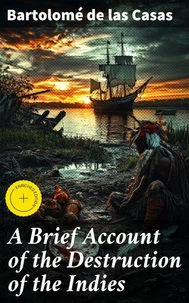A Brief Account of the Destruction of the Indies
Par :Formats :
Disponible dans votre compte client Decitre ou Furet du Nord dès validation de votre commande. Le format ePub est :
- Compatible avec une lecture sur My Vivlio (smartphone, tablette, ordinateur)
- Compatible avec une lecture sur liseuses Vivlio
- Pour les liseuses autres que Vivlio, vous devez utiliser le logiciel Adobe Digital Edition. Non compatible avec la lecture sur les liseuses Kindle, Remarkable et Sony
 , qui est-ce ?
, qui est-ce ?Notre partenaire de plateforme de lecture numérique où vous retrouverez l'ensemble de vos ebooks gratuitement
Pour en savoir plus sur nos ebooks, consultez notre aide en ligne ici
- Nombre de pages81
- FormatePub
- ISBN859-65--4717526-1
- EAN8596547175261
- Date de parution15/08/2022
- Protection num.Digital Watermarking
- Taille354 Ko
- Infos supplémentairesepub
- ÉditeurDIGICAT
Résumé
In "A Brief Account of the Destruction of the Indies, " Bartolomé de las Casas delivers a poignant and vehement denunciation of the atrocities committed against the indigenous peoples of the Americas by Spanish colonizers during the early 16th century. Written in a straightforward yet impassioned literary style, this foundational text in post-colonial literature not only documents the harrowing experiences of natives subjected to violence, enslavement, and cultural eradication, but it also critiques the moral bankruptcy of colonial enterprises.
Las Casas employs vivid imagery and emotional appeals, aimed at evoking a sense of moral urgency, as he seeks to raise awareness among European audiences about the dire consequences of imperialism. As a former conquistador turned Dominican friar, Bartolomé de las Casas witnessed firsthand the brutal treatment of Indigenous populations, which catalyzed his transformation into a passionate advocate for their rights and welfare.
His unique position in colonial society, coupled with his deepening commitment to evangelical Christianity, informed his subsequent writings, framing him as one of the earliest defenders of human rights in the New World. Las Casas's experiences and convictions compelled him to serve as a fierce critic of Spanish colonial policy, making his insights particularly valuable in understanding the moral complexities surrounding colonialism.
This essential read is highly recommended for scholars, historians, and any reader interested in the ethical implications of colonialism. Las Casas's powerful account not only serves as historical documentation but also incites vital discussions about justice, morality, and the consequences of imperial expansion. In engaging with this text, readers will gain a profound understanding of the early colonial period and its lasting impacts on Indigenous populations.
Las Casas employs vivid imagery and emotional appeals, aimed at evoking a sense of moral urgency, as he seeks to raise awareness among European audiences about the dire consequences of imperialism. As a former conquistador turned Dominican friar, Bartolomé de las Casas witnessed firsthand the brutal treatment of Indigenous populations, which catalyzed his transformation into a passionate advocate for their rights and welfare.
His unique position in colonial society, coupled with his deepening commitment to evangelical Christianity, informed his subsequent writings, framing him as one of the earliest defenders of human rights in the New World. Las Casas's experiences and convictions compelled him to serve as a fierce critic of Spanish colonial policy, making his insights particularly valuable in understanding the moral complexities surrounding colonialism.
This essential read is highly recommended for scholars, historians, and any reader interested in the ethical implications of colonialism. Las Casas's powerful account not only serves as historical documentation but also incites vital discussions about justice, morality, and the consequences of imperial expansion. In engaging with this text, readers will gain a profound understanding of the early colonial period and its lasting impacts on Indigenous populations.
In "A Brief Account of the Destruction of the Indies, " Bartolomé de las Casas delivers a poignant and vehement denunciation of the atrocities committed against the indigenous peoples of the Americas by Spanish colonizers during the early 16th century. Written in a straightforward yet impassioned literary style, this foundational text in post-colonial literature not only documents the harrowing experiences of natives subjected to violence, enslavement, and cultural eradication, but it also critiques the moral bankruptcy of colonial enterprises.
Las Casas employs vivid imagery and emotional appeals, aimed at evoking a sense of moral urgency, as he seeks to raise awareness among European audiences about the dire consequences of imperialism. As a former conquistador turned Dominican friar, Bartolomé de las Casas witnessed firsthand the brutal treatment of Indigenous populations, which catalyzed his transformation into a passionate advocate for their rights and welfare.
His unique position in colonial society, coupled with his deepening commitment to evangelical Christianity, informed his subsequent writings, framing him as one of the earliest defenders of human rights in the New World. Las Casas's experiences and convictions compelled him to serve as a fierce critic of Spanish colonial policy, making his insights particularly valuable in understanding the moral complexities surrounding colonialism.
This essential read is highly recommended for scholars, historians, and any reader interested in the ethical implications of colonialism. Las Casas's powerful account not only serves as historical documentation but also incites vital discussions about justice, morality, and the consequences of imperial expansion. In engaging with this text, readers will gain a profound understanding of the early colonial period and its lasting impacts on Indigenous populations.
Las Casas employs vivid imagery and emotional appeals, aimed at evoking a sense of moral urgency, as he seeks to raise awareness among European audiences about the dire consequences of imperialism. As a former conquistador turned Dominican friar, Bartolomé de las Casas witnessed firsthand the brutal treatment of Indigenous populations, which catalyzed his transformation into a passionate advocate for their rights and welfare.
His unique position in colonial society, coupled with his deepening commitment to evangelical Christianity, informed his subsequent writings, framing him as one of the earliest defenders of human rights in the New World. Las Casas's experiences and convictions compelled him to serve as a fierce critic of Spanish colonial policy, making his insights particularly valuable in understanding the moral complexities surrounding colonialism.
This essential read is highly recommended for scholars, historians, and any reader interested in the ethical implications of colonialism. Las Casas's powerful account not only serves as historical documentation but also incites vital discussions about justice, morality, and the consequences of imperial expansion. In engaging with this text, readers will gain a profound understanding of the early colonial period and its lasting impacts on Indigenous populations.






